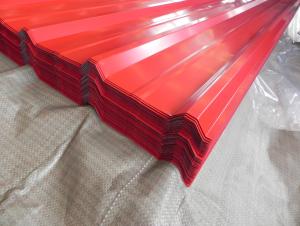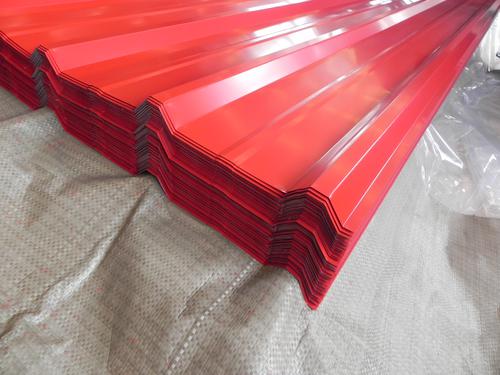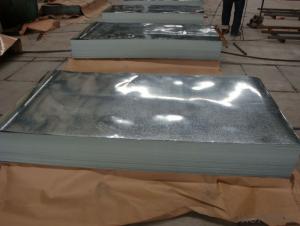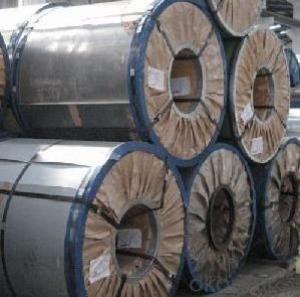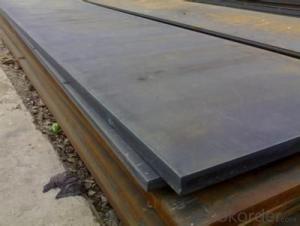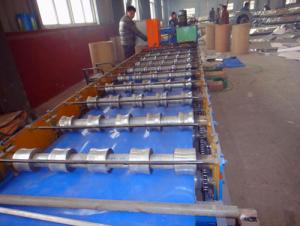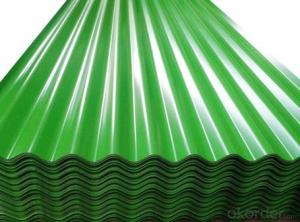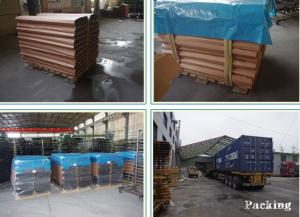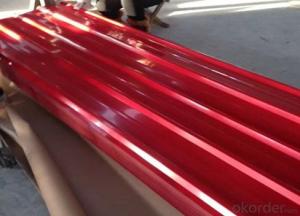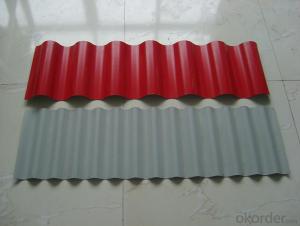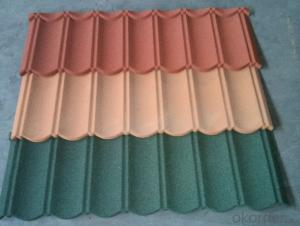color coated roofing sheet
- Loading Port:
- China Main Port
- Payment Terms:
- TT OR LC
- Min Order Qty:
- -
- Supply Capability:
- -
OKorder Service Pledge
OKorder Financial Service
You Might Also Like
color coated roofing sheet
1) Quality Standard & Grade: JIS G3302, SGCC / ASTM 653M CQ/ EN10142 DX51D+Z
2) Thickness: 0.14mm-0.60mm Width: 914mm / 1000mm / 750-1250mm (BC)
3) Thikness tolerance: +/-0.02mm Width tolerance:+/0.02mm
4) Zinc coating : 60g/m2-180g/m2,Z60-Z180
5) color film thickness:20micro(doubled)
6) Surface Treatment: chromated , non oiled, skin passed
7) Packing: export standard packing,packed with moisture resistant paper and metal
wrapping,securely tied for export,on metal skids) Country of Origin :
8)Applications:widely used for roofs, outer walls, cabinets
9)Delivery Time :30 days;Shipment: By bulk vessel or By container
10)payment L/C T/T
- Q: Can steel sheets be used in outdoor applications?
- Steel sheets are a great option for outdoor applications. They possess exceptional durability and strength, enabling them to withstand diverse weather conditions, thus rendering them suitable for outdoor use. The construction industry heavily relies on steel sheets for roofing, siding, and cladding purposes. Additionally, they are extensively utilized in outdoor storage sheds, fences, and gates. To enhance its corrosion resistance against moisture and environmental elements, steel sheets can be coated with galvanization or painting. Consequently, their ability to withstand exposure to such factors is greatly improved. All in all, steel sheets are an exceedingly dependable choice for outdoor applications, thanks to their strength, durability, and versatility.
- Q: Are lead contained in galvanized steel plates and plain steel plates?
- Steel plate is made of molten steel, cooled and compressed into flat steel.
- Q: What is the maximum temperature resistance of steel sheets?
- The maximum temperature resistance of steel sheets is dependent on the specific type of steel and its composition. Stainless steel, in general, exhibits good heat resistance and can endure temperatures up to approximately 1200 degrees Celsius (2200 degrees Fahrenheit) while maintaining its strength and structural integrity. Conversely, high carbon steels can tolerate temperatures up to around 900 degrees Celsius (1650 degrees Fahrenheit) before experiencing a decline in their mechanical properties. It should be noted that these temperature limits are approximate and subject to variation based on factors such as exposure duration, the presence of other elements or impurities in the steel, and the specific application of the steel sheets. Consequently, it is always prudent to refer to the manufacturer's specifications or conduct further research to ascertain the precise maximum temperature resistance of a specific type of steel sheet.
- Q: Can steel sheets be used for transportation equipment?
- Certainly, transportation equipment can utilize steel sheets. The transportation industry extensively relies on steel due to its robustness, longevity, and cost-effectiveness. When it comes to constructing various transportation vehicles like cars, trucks, buses, trains, ships, and airplanes, steel sheets are frequently employed. These sheets find their application in the body panels, chassis, frames, and other fundamental components of these vehicles. Steel sheets possess remarkable mechanical attributes, including exceptional tensile strength and impact resistance, rendering them suitable for enduring the strains and requirements of transportation applications. Moreover, steel is renowned for its ease of formation and weldability, enabling manufacturers to fabricate intricate shapes and structures specifically needed for transportation equipment.
- Q: How do steel sheets perform in cryogenic environments?
- In cryogenic environments, steel sheets prove to be highly effective. Cryogenic temperatures, which often fall below -150°C (-238°F), have the potential to render materials brittle and weaken their strength. Nevertheless, steel possesses remarkable toughness and can endure low temperatures without suffering significant deterioration. Due to their ability to uphold structural integrity and resist fracturing, steel sheets are frequently utilized in cryogenic applications. They exhibit commendable thermal conductivity, enabling efficient heat transfer from the surroundings and preventing the formation of cold spots that could compromise the material's strength. Furthermore, steel's low coefficient of thermal expansion diminishes the likelihood of dimensional alterations caused by extreme temperature fluctuations. This property is of vital importance in cryogenic environments where precision and stability are imperative. Moreover, steel exhibits resistance to embrittlement, a phenomenon that affects select materials when exposed to cryogenic temperatures for prolonged periods. Certain materials become more prone to fracturing due to the diffusion of hydrogen or other gases into their lattice structure. Conversely, steel displays a high resistance to embrittlement, rendering it a dependable choice for cryogenic applications. To sum up, steel sheets perform exceptionally well in cryogenic environments. They maintain their structural integrity, resist embrittlement, and minimize dimensional changes, making them a suitable material for various applications in industries such as aerospace, energy, and research.
- Q: Can the steel sheets be easily cleaned?
- Yes, steel sheets can be easily cleaned. Steel is known for its durability and ease of maintenance. It can be wiped clean using a damp cloth or sponge with mild soap or detergent. For tougher stains or grime, a non-abrasive cleaner can be used. Additionally, steel sheets are resistant to rust and corrosion, making them suitable for various environments and easy to maintain in the long run.
- Q: What is the difference between plain carbon steel sheet and stainless steel sheet?
- Plain carbon steel sheet and stainless steel sheet are both types of steel sheets, but they exhibit several distinct dissimilarities. The primary contrast between plain carbon steel sheet and stainless steel sheet resides in their composition and characteristics. Plain carbon steel sheet consists predominantly of iron and carbon, with minor amounts of other elements like manganese and silicon. It is renowned for its strength and durability, rendering it suitable for a wide array of applications. However, plain carbon steel is susceptible to rust and corrosion when exposed to moisture or certain chemicals. Conversely, stainless steel sheet comprises iron, carbon, and a minimum of 10.5% chromium. This inclusion of chromium forms a protective layer on the steel's surface, referred to as a passive film, which prevents corrosion and rusting. Stainless steel manifests high resistance against stains, heat, and corrosion, making it an ideal choice for scenarios where hygiene and durability are pivotal, such as the food and medical industries. Another notable difference between the two steel sheet types lies in their appearance. Plain carbon steel sheet exhibits a mundane grey finish, whereas stainless steel sheet boasts a lustrous, reflective surface. This aesthetic distinction often holds significance in industries where the material's visual appeal is crucial, such as architectural or interior design applications. Furthermore, stainless steel sheet commands a higher price point compared to plain carbon steel sheet. This discrepancy arises due to the additional alloying elements, such as chromium and nickel, incorporated to enhance its corrosion resistance and other properties. The elevated cost of stainless steel is frequently justified by its superior performance and longevity in corrosive environments. To summarize, the key disparities between plain carbon steel sheet and stainless steel sheet encompass their composition, properties, appearance, and price. Plain carbon steel epitomizes strength but is prone to rust, while stainless steel epitomizes corrosion resistance and showcases a lustrous finish. The selection between the two hinges upon the specific requirements of the application, encompassing the necessity for corrosion resistance, aesthetics, and budget constraints.
- Q: Can steel sheets be used for structural applications?
- Yes, steel sheets can be used for structural applications. They are commonly used in construction, manufacturing, and engineering industries for building frameworks, bridges, and other load-bearing structures due to their high strength and durability.
- Q: What are the different sheet metal rolling techniques for steel sheets?
- Steel sheets can be rolled using different techniques, including hot rolling, cold rolling, and roll forming. Hot rolling involves heating steel sheets above their recrystallization temperature and passing them through rollers to reduce thickness. This method is commonly used to produce steel sheets with consistent thickness and improved mechanical properties. In contrast, cold rolling rolls steel sheets at room temperature. This process creates thinner and smoother sheets with higher dimensional accuracy. Cold-rolled steel is often used for applications that require a high-quality surface finish, such as automotive body panels and appliances. Roll forming is a continuous bending process where a long strip of steel is gradually shaped into a desired profile using rollers. This technique is suitable for producing steel sheets with complex shapes and profiles, like corrugated roofing or C-channel beams. Roll forming offers excellent precision and repeatability, making it a popular choice for mass producing steel sheets with consistent dimensions. Ultimately, the choice of rolling technique depends on the specific requirements of the application. Hot rolling is ideal for achieving uniform thickness and improved mechanical properties. Cold rolling is preferred for applications that demand high-quality surface finish and dimensional accuracy. Roll forming is suitable for creating steel sheets with complex shapes and profiles.
- Q: How do steel sheets perform in extreme weather conditions?
- Steel sheets are highly durable and resistant to extreme weather conditions. They are able to withstand high winds, heavy rain, snow, and even hail. Due to their strength and corrosion-resistant properties, steel sheets provide excellent protection against harsh weather elements, making them a reliable choice for various applications in extreme weather conditions.
Send your message to us
color coated roofing sheet
- Loading Port:
- China Main Port
- Payment Terms:
- TT OR LC
- Min Order Qty:
- -
- Supply Capability:
- -
OKorder Service Pledge
OKorder Financial Service
Similar products
Hot products
Hot Searches
Related keywords
